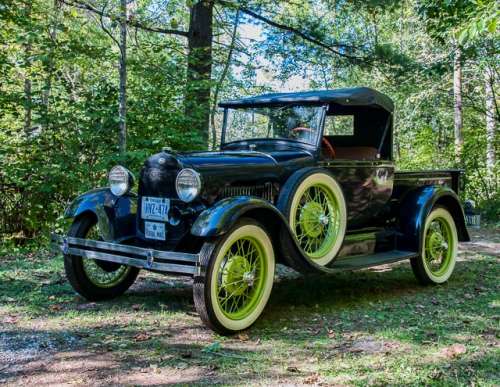Classic car values vary greatly based on the uniqueness, quality and a variety of more subtle factors. The bottom line is that most people are not as capable as professional appraisers to establish a value. The professional appraiser will come with a knowledge of how the true value of a vehicle is determined and they will have a good sense about where to look for problems. There are a lot of "would-be" appraisers out there who think they know everything so be careful. A reputable appraiser will be certified and happy to give you references.

1928 Ford Model A *
Antique and classic cars are often valued on sentimentality. It makes no economic sense but many people fall in love with their old cars and you may have to pay a premium to pry them away. And if you get drawn into the emotion and develop a misguided love for the same vehicle it could get very expensive. A professional appraiser will realize this and be able to advise you accordingly.
If you can not afford a qualified appraiser there are other options. The next best bet would be to ask a local car club for assistance. Offer to donate something to the club in exchange for them taking a team approach to surveying your purchase and most clubs will agree. You will not get the expertise that a professional can offer but you will get the opinions of a lot of curious and knowledgeable eyes.
A car's "blue book" value is an old term that refers to the Kelley Blue Book, which was started by Les Kelley in 1918. The Kelley Blue Book is now one of several classic car evaluation guides available to the public at no cost. One drawback of the Kelley Blue book is that it only goes back ten years, so it is not much use to the classic car collector. AntiqueCar.com features the NADA (National Automobile Dealer's Association) car value finder because it goes back to 1926. But keep in mind, all vehicle value guides are just that, "guides", and should be used only as a rough estimate. Vehicle values often vary according to the location and even the time of year. The best value guide is local knowledge. Watch you local newspapers and used car dealers to see what others are asking - and getting for their vehicles.
Without outright lying many sellers will exaggerate a bit and conveniently leave out important information such as recent repairs, history of accidents and recalls. Knowing ahead of time what the car consisted of when it rolled off the assembly line and the current condition it is now will allow you to gauge the value better. Some owners keep classic cars in mint condition and have the paperwork to prove it while others are simply trying to unload an old car. Part of every good appraisal is an thorough inspection and the purchase of an auto history report, such as offered by CarFax©.
Do not ever buy a classic car without inspecting it first. If you are not very car-savvy find a mechanic who is qualified to take a look. Old cars need to be looked over very carefully because most will require some repairs which can be very expensive. We offer a free inspection checklist in our Buying Reference Guide. The inspection should be very thorough and include everything inside and out.
The history report is equally as important. There are many unscrupulous car dealers out there who will buy cars that have been in a fire, flood or even totaled by an insurance company and then patch them up to sell. If the car has been involved with an insurance company or been recalled by the manufacturer the situation will be documented in the vehicle history report.
A classic car appraisal service will know how to evaluate antique, vintage and classic vehicles. You will find classic car appraisal sources in our Business Directory.



